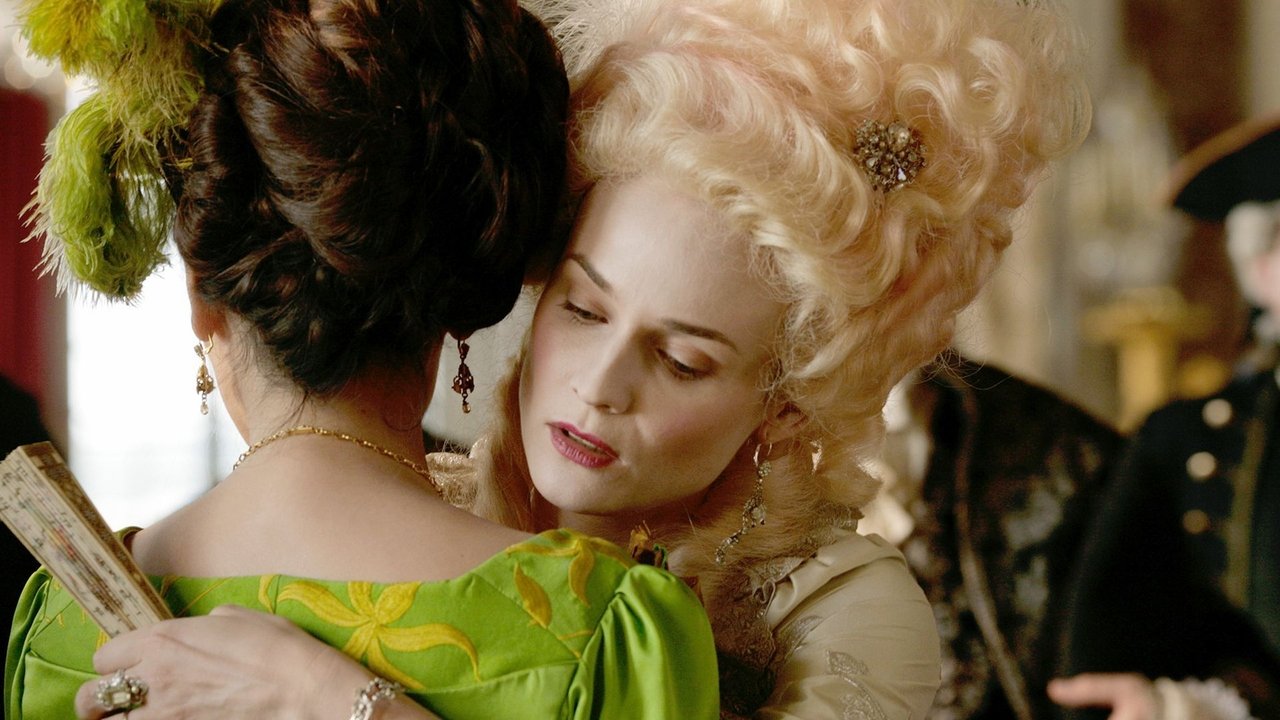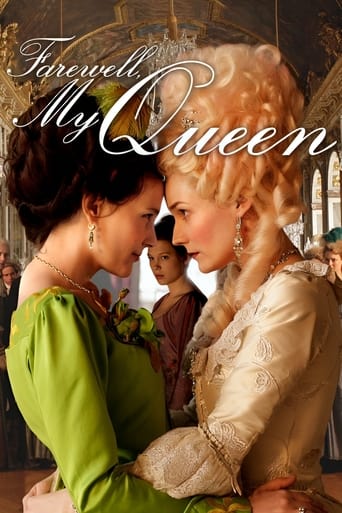

Who payed the critics
... View MoreOverrated and overhyped
... View MoreI'll tell you why so serious
... View MoreIt's a mild crowd pleaser for people who are exhausted by blockbusters.
... View MoreI did see this movie not long ago and in my personal opinion, it is not boring at all. In fact I see it as quite exciting because it is one of the few films that comes very close to the historical Marie-Antoinette and her real nature as a human being. I also did see the other film of Coppola and did not agree with it at all cause I thought it to be way too superficial and only showing one side of a very complex historical personality. In fact I was very annoyed and mad about it because it is inexcusable to see such a careless handling of such an interesting and disrupted character like the last French Queen.Actually I honestly am quite surprised as to how few movies actually give justice to the real historical personality and how few details of her biography are told. Reality is never that simple and never as one-sided, and it would be wrong to only show the Queen as someone who loved luxury and ruthlessly spent all the taxmoney of the people, uncaring if they were hungry or not. Coppola completely leaves out the element that luxury often only is a way to evade and to distract oneself of the real problems and important matters of life. One of the important issues in these cases to have a son and to make the dynasty live on, which was the Queen's first "official" task - and this task caused her unhappiness for quite a long time cause her husband did have a phimosis. The other important issue was loneliness, and yes I firmly do believe that she must have been terribly lonely in such a place like Versailles in which there were not many good and decent people to have as friends. She probably would have needed someone like Sidonie, sadly she did not exist.All of this was never mentioned in the Coppola adaptation. "Les Adieux à la Reine" comes closer to reality because it shows Versailles the way it supposedly was back then. It also shows the queen as a real disrupted human being with real emotions like regret and abandonment, and someone who was able to love and being loved in return (not like a lot of "fake" people nowadays). I missed that a lot in the other one which in my opinion gives a totally wrong image of the Queen as the human being she was. Also Coppola did not show the heavy change she went through in the last days of the revolution when she woke up to reality and became considerate, dutiful and thoughtful as well (too late as historians would probably say and it didn't save her from being killed). I give this film 8 of 10 stars because I actually think that the ending sucks somewhat because Sidonie leaves and never comes back. I know the ending wanted to add to the subtility overall but in my eyes that simply didn't work very well. 8 of 10 because I thought the acting to be very impressive and the characters well-described, and plus I think there is a lot of tactfulness to the character development and historical correctness. I think it definitely has the necessary requirements to become a classic overall.
... View MoreThis is a modern historical drama. Characters are not well-developed, and their motivations are not clear. Why is Sidonie so devoted to the Queen? Why does she suddenly want to have sex with the gondolier? Instead, there is LOTS of atmosphere, which makes for one slow film.You won't learn much about what actually happened in the week that followed the fall of the Bastille, since the story, to the extent that there is a story, is told through the eyes of one of the Queen's domestics. (It does remind you that, in a day not only before computers and the internet, but even television and radio, you could live 30 miles away from momentous events and have no idea what was going on.) Nor will you learn much about Marie-Antoinette or Louis XVI. The latter is a minor character here. MA comes off as very capricious, which she evidently was. But why? Again, there is no character development.And then, finally, the movie stops, and you go "Oh, is it over?" As I said, LOTS of atmosphere. If that floats your boat, you might like this movie.It did nothing for me, and I'm very interested in French history.
... View MoreI like it. it is not impressive, great or memorable. but it has inspired cast, nice costumes and a fragile story. and this is enough. sure, it is not a portrait. only an adaptation or, if the novel is not known, a drawing about beginning of strong storm. but it may be a real delight, or lemon tea for a fan of French court of Louis XVI. or good point for search informations about this fundamental event. sure, not accuracy is virtue of this film. but more important is its flavor. the fall of a world. the need of change. the news about events out of golden circle, the references and, sure, the way of a young woman - part of sophisticated system. that is all. a film without heroes - if ignore the performance of Michel Robin and small slices of Xavier Beauvois presence.
... View MoreIf you are expecting a French film chronicling the last days of Marie Antoinette, then you may be in for a slight disappointment. Brilliantly directed by the Benoit Jacquot (who also co-wrote the much less impressive script) and starring Diane Kruger as Marie Antoinette and Lea Seydoux, who plays one of the Queen's readers named Sidonie Laborde, and is also the protagonist of this film (for some reason) "Farewell, My Queen" is advertised as the story of the last days of Marie Antoinette, but it's more like the somewhat muted story of the two months before the "last days" of Marie Antoinette. So, even though "Farewell, My Queen" is a better movie than Sofia Coppola's ill advised, indie rock inspired, "Marie Antoinette", due to the faux-final-days story structure, in conjunction with the fact that "Farewell, My Queen" uses Marie Antoinette as a side character, telling the story from the point of view of Sidonie Laborde (a nobody) this is a film which may have many audiences scratching their heads as to why the need to show this particular moment in the life of Marie Antoinette.As I alluded to above, "Farewell My Queen" chronicles a miniscule portion in time during the last months of Marie Antoinette's reign. However, audiences are not treated to "the good part", or the part they undoubtedly came to see. What I mean by this is there are almost no visuals of the actual Revolution, plus (and more importantly) we don't actually get to witness the final days of Marie Antoinette's life simply because "Farewell, My Queen" curiously plays out through the eyes of one of her ladies-in-waiting. Instead, audiences are forced to sit through a pseudo-love story that focuses not on the very interesting end of Marie Antoinette's reign, but on the minutiae right before it! This film is the equivalent of sitting through the love story of Jack and Rose, with the movie ending just before the Titanic strikes the iceberg. Yes, I am aware that this is a script which was adapted from a critically acclaimed novel by Chantal Thomas, BUT it still doesn't make the story's focus any less misguided. I mean, there are some scenes which do attempt to create a somewhat intriguing love story, an aspect which must be fully accredited to some fantastic mood setting by Jacquot, but in the same vein, this film never rises above said simplistic love story.Side Note: Another issue many audiences will likely come across is how frivolously "Farewell, My Queen" throws its viewers right into the deep end of this story, with little exposition. In fact, the greatest individual flaw which hinders "Farewell, My Queen" will be seen in the audiences immediate realization that neither Jacquot's visuals or the engaging performances (which I will speak about later) are going to give those not formally versed in the players of the French Revolution and the fall of Versailles, the background information they may desperately desire, as this film half-introduces more and more characters of seeming importance. So, do yourself a favor, if you are going to see "Farewell, My Queen" (at the very least) peruse the Marie Antoinette Wiki page before going to see this film.With that said, the visuals (the set design in conjunction with the director) are somewhat breathtaking at times, due to Jacquot making some very brave directorial choices, including tons of long takes which trail behind characters as they weave in and out of crowds, giving audiences an intimate feeling of the atmosphere of late 1700's France, and a few beautifully constructed shots of the landscapes. And I guess it doesn't hurt that the two female leads, Seydoux and Kruger, both give engaging performances. But even if Kruger's interpretation of Antoinette is one of the best I've ever seen and Seydoux is so captivating to watch as she effortlessly takes control of the movie every time she is on screen, there is simply not enough in the story or the writing to give reasoning to the eccentric behavior or motives behind the actions of Marie Antoinette or (more importantly) give a reason as to why Sidonie is so infatuated with her. So, even though, in the latter half of the film (more than an hour in) Jacquot does create an atmosphere which allows these characters to somewhat blossom, many will find it hard to care about a Marie Antoinette story that contains no beheadings.Final Thought: Based on a "last days" plot which attempts to imitate a much better film like "Downfall", even with some spectacular direction and two engaging female performances, "Farewell, My Queen" is nothing more than this year's "My Week With Marilyn", telling a story which focuses on characters nobody really cares about, rather than simply creating a storyline around the life/last days of (in this case) Marie Antoinette. So, even if you are a Marie Antoinette fan, with the overall structure the way it is, "Farewell, My Queen" is nothing more than DVD worthy at best.Follow me on Twitter @moviesmarkus Find more review at: movieswithmarkusonline.blogspot.com
... View More